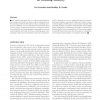Free Online Productivity Tools
i2Speak
i2Symbol
i2OCR
iTex2Img
iWeb2Print
iWeb2Shot
i2Type
iPdf2Split
iPdf2Merge
i2Bopomofo
i2Arabic
i2Style
i2Image
i2PDF
iLatex2Rtf
Sci2ools
JOCN
2010
2010
Prefrontal Control of Familiarity and Recollection in Working Memory
■ Left inferior frontal gyrus (IFG) is a critical neural substrate for the resolution of proactive interference (PI) in working memory. We hypothesized that left IFG achieves this by controlling the influence of familiarity- versus recollection-based information about memory probes. Consistent with this idea, we observed evidence for an early (200 msec)-peaking signal corresponding to memory probe familiarity and a late (500 msec)-resolving signal corresponding to full accrual of trial-related contextual (“recollectionbased”) information. Next, we applied brief trains of repetitive transcranial magnetic stimulation (rTMS) time locked to these mnemonicsignals,toleftIFGandtoacontrolregion.OnlyearlyrTMS of left IFG produced a modulation of the false alarm rate for high-PI probes. Additionally, the magnitude of this effect was predicted by individual differences in susceptibility to PI. These results suggest that left IFG-based control may bias the influence of familiarityand recoll...
Critical Neural Substrate | Inferior Frontal Gyrus | JOCN 2010 | Repetitive Transcranial Magnetic Stimulation |
| Added | 28 Jan 2011 |
| Updated | 28 Jan 2011 |
| Type | Journal |
| Year | 2010 |
| Where | JOCN |
| Authors | Eva Feredoes, Bradley R. Postle |
Comments (0)

